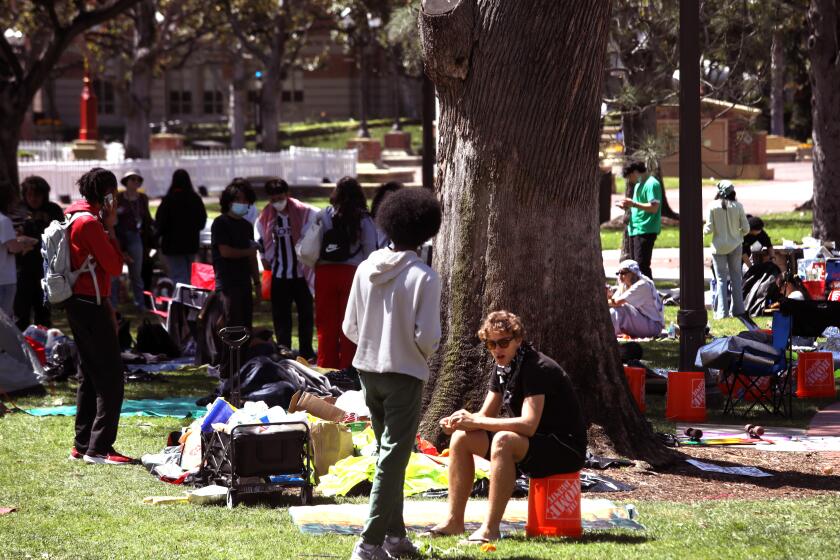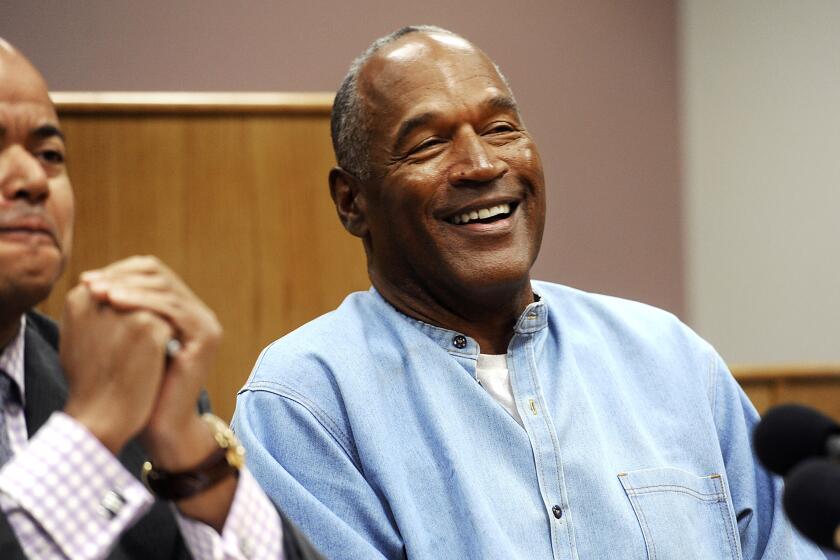‘They Put Us in a Cell and Forgot Us’
The wiry Los Angeles aspiring filmmaker was an unlikely prisoner inside a cell block that included Tariq Aziz, Saddam Hussein’s deputy, and other high-level officials of the former regime.
But after 54 days of detention, Cyrus Kar, a 44-year-old Iranian American working on a documentary film about the 5th Century BC Persian emperor Cyrus the Great, was released Sunday and headed to the relative safety of a Baghdad hotel outside the U.S.-protected Green Zone.
Kar, speaking to reporters, described long, frustrating days in solitary confinement with little information about his status or reason for being held. At the same time, Kar said he was well-treated while he was held and understood security concerns in war-torn Iraq.
“I don’t hold anything against them for holding us,” he said. “What I hold against them is they put us in a cell and forgot us.”
He and his cameraman, Farshid Faraji, a freelance journalist for Iranian television and a resident of Tehran, were detained after they were found riding in a taxicab that unbeknownst to them, they said, contained 35 to 37 timers for washing machines, which can be used by insurgents to make bombs.
Kar was held in Camp Cropper, the detention facility housing Saddam Hussein and other regime stalwarts. Faraji, 34, was held in a section of the infamous Abu Ghraib prison that included suspected foreign fighters from Saudi Arabia, Morocco, Sudan and Egypt. On Sunday, Kar and Faraji lumbered their equipment and their remaining possessions up to their small room and chatted about their ordeal, recalling their frustration with the American authorities who held them.
“They knew from the get-go that we were nothing more than filmmakers,” said Kar, who served in the Navy. “They saw my VA card in my wallet.”
Kar called the circumstances of their May 17 arrest in the city of Balad “quite bizarre.” He and Faraji had hired a taxi driver about an hour before the arrest. As the cab was waved through a checkpoint manned by Iraqi soldiers, the driver pulled over and told authorities he had two Iranian filmmakers in his cab.
Iraqis sometimes suspect Iranian pilgrims and businesspeople of being spies for the religious regime in Tehran.
The soldiers searched the car and in the trunk found the three dozen washing machine timers. The driver admitted the timers were his, but the soldiers arrested all three men, handing them over to Americans.
U.S. officials said in a news release that the driver of the taxi remains in custody pending the results of investigations into his activities.
“He was a shady character,” Kar said.
After the arrest, Kar was quickly sent to Camp Cropper, where he said he believes that he was held in solitary confinement only for his own protection. He was allowed out of his cell for one hour a day but was not permitted to speak with the other detainees.
“All I can say is I have the highest regard for our men in uniform. I have no grudge against them,” he said.
Kar’s predicament attracted attention last week when stories prompted by the ACLU and his family appeared in the New York Times and the Los Angeles Times.
Kar said he repeatedly asked to see someone from the embassy but no one came until Saturday.
He said he also asked for an attorney but never saw one.
Kar said he passed a lie detector test in which he was asked whether they belonged to the insurgency. His eight weeks of confinement were dull. He was not allowed to speak to any of the detainees that were housed with him, he said. He spent his days reading through the Geneva Convention, which he can now practically recite.
At a news conference Sunday in Los Angeles, Kar’s cousin Shahrzad Folger said, “The three phone conversations he had with us” while he was detained provided “the most information he had been given the entire time.”
Folger also recalled one conversation in which Kar told her he felt like “a mushroom. He was left in the dark” and was given “garbage” instead of accurate information.
Folger joined with Kar’s aunt, Parvin Modarress, at the offices of the ACLU of Southern California to thank the public, the media and ACLU attorneys for drawing attention to the detention and to a federal court lawsuit that challenged the military’s actions.
“I think it is probably safe to say it is not a coincidence that he just happened to get out the day before” a federal judge in Washington, D.C., had ordered the government to explain in court why it was still holding Kar, Folger said.
Mark Rosenbaum, legal director of the ACLU of Southern California, said the lawsuit will move forward until Kar is safely back in the U.S.
One high-ranking FBI official confirmed Sunday that Kar had passed a national security investigation, which is essentially tailored to identify foreign spies or someone planning sabotage. Asked why Kar remained in military custody for weeks, the official said: “One word: bureaucracy.”
The authorities threw away the pair’s clothes but bought them new ones after their release. Kar said a $500 graduation ring from Pepperdine University was taken from him at the time of his arrest but was not returned. About $600 in cash, a cell phone and a digital camera with pictures from his trip disappeared from their hotel room while they were in custody, and Kar said the FBI damaged his U.S. passport while examining whether it was authentic.
Rosenbaum and Kar’s family said that during the government’s investigation, U.S. authorities destroyed about 20 hours of footage for his film, as well as a laptop that had nothing on it but information related to Kar’s documentary.
Rosenbaum said he and two other ACLU attorneys on the case, Ahilan Arulanantham and Ranjana Natarajan, spent hours on the phone Sunday with the U.S. Embassy in Baghdad trying to expedite Kar’s return.
With his passport unusable, they were told, Kar would not receive another one for at least a week.
Kar’s family and the ACLU attorneys decried the military’s actions, with Rosenbaum calling the government statement “a disgrace.”
But military officials said Sunday that the matter had been handled and resolved appropriately.
“This case highlights the effectiveness of our detainee review process,” Brig. Gen. Don Alston was quoted as saying in the statement. “We followed well-established procedures, and Mr. Kar has now been properly released.”
In its statement, the military said Kar was detained as “an imperative security threat” under the authority of a United Nations Security Council resolution--noting that the washing machine timers found in the taxicab are a “common component” in the construction of improvised explosive devices.
After Kar’s initial questioning, the military said, it notified the FBI, which began an investigation to determine if he had engaged in any terrorist actions. After the FBI notified the military of its findings, the statement said, coalition forces convened a detainee status board July 4 to decide if he was an enemy combatant.
“Based on the FBI investigation, the testimony of Kar and the witness he called, and other witness statements, the board determined Kar was not an enemy combatant and recommended his release, which was approved,” the news release said.
“We understand this has been difficult for Mr. Kar and his family,” Alston said in the statement, “however, we owe the coalition forces, Iraqi security forces and Iraqi civilians a thorough investigation, especially when the circumstances relate to serious and potentially dangerous activity.”
For both Kar and Faraji, the experience was difficult and nerve-racking.
Faraji, who bathed himself in hot water for nearly 30 minutes after arriving at the hotel, said being locked up amid the squalor of Abu Ghraib shook his faith in the U.S.
At the prison, he said, he was housed in a tent surrounded by barbed wire. He slept on dirty slippers as men urinated in containers next to him.
The experience has left Kar, who had supported the war in Iraq, with a changed outlook on American policy. He said he still believes the U.S. should bring democracy to fascist states, “but it must be done by competent administrators.”
But the days of captivity amid such figures as Sabawi Ibrahim Hassan Tikriti, Saddam’s half brother, didn’t squelch Kar’s dream of making a movie about his namesake.
“Iran has had a bad rap for a long time,” Kar said. “I think Cyrus was one of the most underrated heroes of all time. He was far greater than Alexander or Caesar, but he gets no recognition because history is always written by the victor.”
The Persian king ruled 500 years before the birth of Christ and is believed to have written the first charter of human rights.
And even Sunday, finally released from detention and resting in a Baghdad hotel, Kar vowed to find his way to the ruins of Babylon to gather footage for the movie he envisioned even before the events of Sept. 11, 2001, plunged the region into turmoil. This is his first film project, a family member said.
Kar, who was born in Iran, came to the United States when he was 9, served three years in the Navy and became a citizen 20 years ago. He earned a degree in marketing from San Jose State and worked in Silicon Valley during the boom period there.
He then moved to Los Angeles, where he got a master’s degree in technology management from Pepperdine University. He has held a variety of jobs, including teaching business courses for an online university.
He has traveled to Iran, Afghanistan and Tajikistan, as well as the ruins of northern Iraq for his documentary. But Babylon was Cyrus’ crown jewel.
“Not going to Babylon to shoot would be like making ‘Gone with the Wind’ without including the line, ‘Frankly, my dear, I don’t give a damn,’ ” he said, proudly showing a letter from the Ministry of Culture granting him permission to film the site.
Now that he’s been freed, he faces a challenge more common to independent filmmakers.
“We are running out of money,” he said. “We are on our last dime.”
Kar appeared stunned when a group of Western journalists showed up at his door and explained the legal and political controversy that had erupted around his case over the last few days, splashing minute details of his life, including a description of his Los Feliz apartment, across the media.
He said the circumstances of his and Faraji’s release suddenly made sense.
“Now I understand what happened, why they let me see someone from the embassy,” he said. “I’m positive if it weren’t for you guys I would still be in there.”
*
Times staff writer Greg Krikorian contributed to this report from Los Angeles.
More to Read
Start your day right
Sign up for Essential California for news, features and recommendations from the L.A. Times and beyond in your inbox six days a week.
You may occasionally receive promotional content from the Los Angeles Times.






